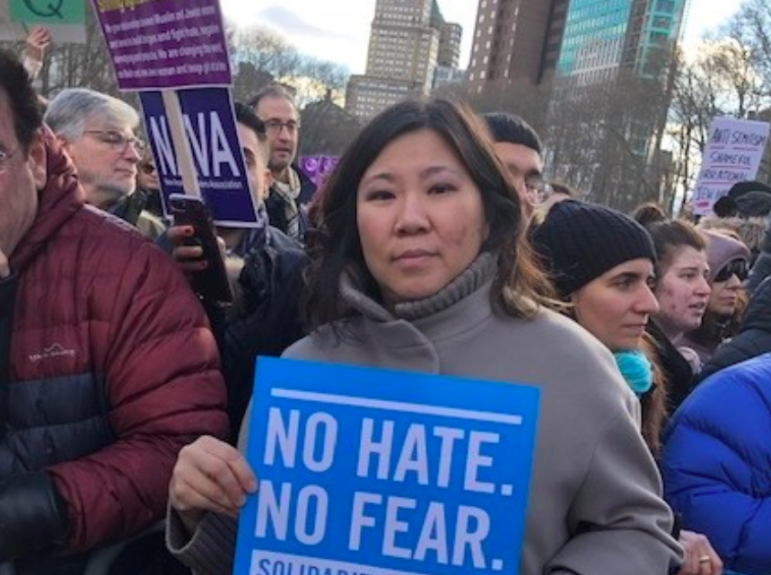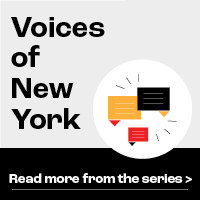
Office of Congresswoman Grace Meng
Congresswoman Grace Meng, seen at a pro-immigrant rally in January, says she and other federal lawmakers are working to pass bills that would extend the Census until September, citing the risk of having Census-takers go door-to-doorIn the last few days, city and state lawmakers have escalated their response to the ongoing coronavirus pandemic. Schools are shuttered, gatherings of more than 50 people are banned and the city’s theaters, bars and restaurants must close, with the exception of food take-out and delivery.
In spite of these efforts, advocates say there’s a core group of New Yorkers being overlooked in the government’s COVID-19 response plans: its 4.5 million immigrants.
“Immigrant communities are on the front lines, both in terms of the impact of this crisis and the response,” says Steve Choi, executive director of the New York Immigration Coalition (NYIC), which released a platform of policy demands and recommendations Monday it says will better protect immigrants during the ongoing health emergency.
Many immigrants workers have jobs that require them to interact with the public, which don’t allow them to self-isolate or work remotely, Choi said during a conference call with reporters on Monday. Many of these jobs—such as childcare, food delivery and cleaning services—may actually be in greater demand during the pandemic, as workers in more white-collar fields stay home and public spaces require decontamination.
“Many workers are going to have to do more work to allow other workers to work remotely,” Choi said. “We’ve got to recognize that fact—that a lot of workers are unwillingly exposing themselves to the virus because they don’t have a choice.”
NYIC and other advocates released its “New York United” campaign on Monday, calling for a number of policy actions on the city, state and federal level, including that COVID-19 testing be free and available to all residents, including undocumented immigrants. U.S. Citizenship and Immigration Services has stated that immigrants who seek healthcare or preventative services related to the Coronavirus won’t have it counted against them when applying for a green card under the federal government’s Public Charge test.
“We need to make sure we are holding them accountable [to that],” said Congresswoman Grace Meng, who represents parts of Queens. She said she and other federal lawmakers are working to pass bills that would extend the Census until September—citing the risk of having Census-takers go door-to-door—and another that would provide internet hotspots to families who lack access, as closed city schools are scheduled to shift to online instruction starting March 23.
“There are many families, up to 30 percent in New York City, who don’t have access to the internet,” Meng said.
The “New York United” campaign is demanding that all Immigration and Customs Enforcement activity be suspended during the pandemic, as doing so could put more residents at risk and will add to the fear immigrants are already facing.
“Despite all of the warnings around social distancing … The one area that seems not to be closing down is ICE enforcement,” Choi said.
On the city and state level, the coalition is pushing to ensure that any COVID-19 relief programs—such as emergency grants for workers, unemployment insurance, small business loans and extending paid sick leave benefits—can also be accessed by undocumented residents.
Manny Castro, executive director at New York Immigrant Community Empowerment, said this was an issue after both Sept. 11 and Hurricane Sandy, when undocumented immigrants were locked out of many recovery programs because of their legal status.
“We learned that so much of the relief funds were tied up with federal monies that could not be used to support undocumented families,” he said.
Advocates say it’s essential that funding is also allocated to nonprofits and community-based organizations that serve the city’s immigrant communities, many of which will remain open to provide support during the pandemic. The group says the city and state needs to make sure accurate information about COVID-19 is available in multiple languages, such as through a phone hotline.
“There is still a lot of misinformation being transferred in our communities, especially for the undocumented populations,” said Mon Yuck Yu of the Academy of Medical and Public Health Services, Inc., which provides health services to immigrants in Sunset Park, Brooklyn. She said there was a false rumor in the community that getting tested for COVID-19 costs $3,000.
“It is really our responsibility to combat some of these myths,” she said.
Additionally, the group says now is the time for state lawmakers to pass the Coverage for All Act, sponsored by Assembly Member Richard Gottfried and Senator Gustavo Rivera, which would extend the state’s Essential health plan for low-income New Yorkers to cover those who earn up to 200 percent of the poverty level but are currently excluded because of their immigration status.
“While most of the city is shutting down, immigrant workers are exposing themselves to this virus as cleaning workers, day laborers, restaurant and delivery workers,” said Castro. “Their work cannot be done by telecommuting, and in fact the city is increasingly dependent on this labor force.”











3 thoughts on “Advocates Demand Protection for Immigrants at ‘Front Lines’ of Coronavirus Outbreak”
These people come here breaking our laws now we want to pay them this is just wrong on so many levels.. the American people should always come first let the illegal aliens go home to their own country
Yes at all costs……AMERICANS COME FIRST! Sorry
Yes, this jobs should go to proud white Americans who are God fearing and law abiding. 🇺🇸🇺🇸🇺🇸